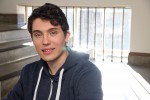Vlad Stoicescu-Ghica crams his schedule with jobs and internships on his quest to become an attorney like his mother used to be in his home country of Romania.
The third-year political science student’s aspirations are also motivated by experiencing the legal system’s inadequacies firsthand as an undocumented individual.
“I want to be there to watch for the cracks in the system and I want to be at the forefront to fight for (underprivileged) communities,” Stoicescu-Ghica said.
Stoicescu-Ghica is one of about 900 undocumented students in the University of California system, according to a recent speech by UC President Janet Napolitano.
Stoicescu-Ghica originally immigrated to the United States in 2002 with his mother, Liana Ghica, who was an attorney and chief of staff for the Romanian Department of Justice in Bucharest.
About 6,500 miles away from his childhood home near the bustling streets of Bucharest, Romania, he had to adopt a new language and culture – a task made even more difficult by his status as an undocumented individual.
Ghica, a single mother, said she had been promised employment and a work visa by a U.S. law firm at the time of their immigration, but the firm never followed through.
Ghica and her son got lost in the system, entering undocumented status.
For the next few years, Ghica said she worked multiple minimum-wage jobs, such as busing restaurant tables and working mall security, just to scrape by, a difficult transition for the former attorney.
“It was like falling from the top of the mountain to the bottom of the cliff,” Ghica said.
Once Stoicescu-Ghica turned 16, he started working as well, accompanying his mother to events and finding various odd jobs from his friends’ parents, such as private tutoring, shed building and concrete laying in order to supplement the family income.
He had to do everything and anything just to get by, something many undocumented students go through, Stoicescu-Ghica said.
Stoicescu-Ghica added that being undocumented motivated him to work even harder to try to go to college. He said he ran track and field in high school, volunteered in his local community and worked hard in academics.
“Being undocumented there’s no choice; you feel like you have to go to school, have to get good grades, have to be involved in the community – or else there’s nothing for you,” Stoicescu-Ghica said.
Bijan Zarrabi, a third-year psychobiology student, has been friends with Stoicescu-Ghica since high school.
Zarrabi said people are often surprised to find out Stoicescu-Ghica is undocumented.
“He doesn’t let it bother him at all on the surface,” Zarrabi said. “He does all that he can and all in his power to make sure that his family is always in a good position.”
Now a full-time UCLA student, Stoicescu-Ghica is determined to make things work.
He is actively pursuing his studies in political science while balancing employment at the UCLA Anderson School of Management and the Department of Chicana/o Studies and an internship at a local Beverly Hills law firm.
Whatever spare time he has left between work, classes and the three-hour commute from his home in San Fernando Valley, Stoicescu-Ghica spends as an active board member and project director for Improving Dreams, Equality, Access and Success – or IDEAS – at UCLA, a student group that acts as a support network for undocumented students.
Stoicescu-Ghica also organizes conferences to help undocumented students obtain the financial support they need to finish college. He recently helped host a conference on Assembly Bill 540, which is part of two laws that make up the California DREAM Act, allowing some undocumented students to pay in-state tuition.
For all he has done, Stoicescu-Ghica tries to keep things in perspective, remembering the sacrifices his family made so that he can be where he is today.
He said he is grateful to his mother for all the sacrifices she made to make his life possible and for inspiring him toward a career in law.
“She’s a fighter and she will do whatever it takes (for me),” Stoicescu-Ghica said. “She has been my primary role model for the last 10 years and I am very lucky to have her.”
